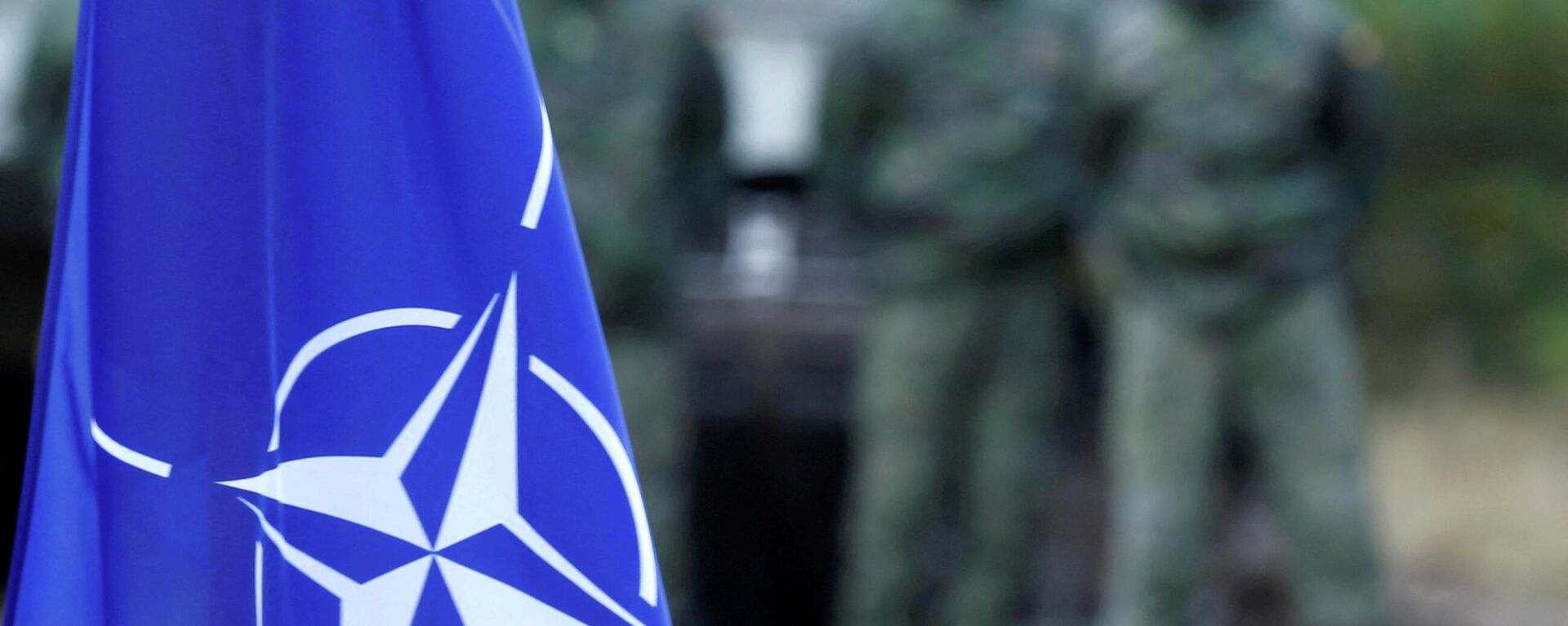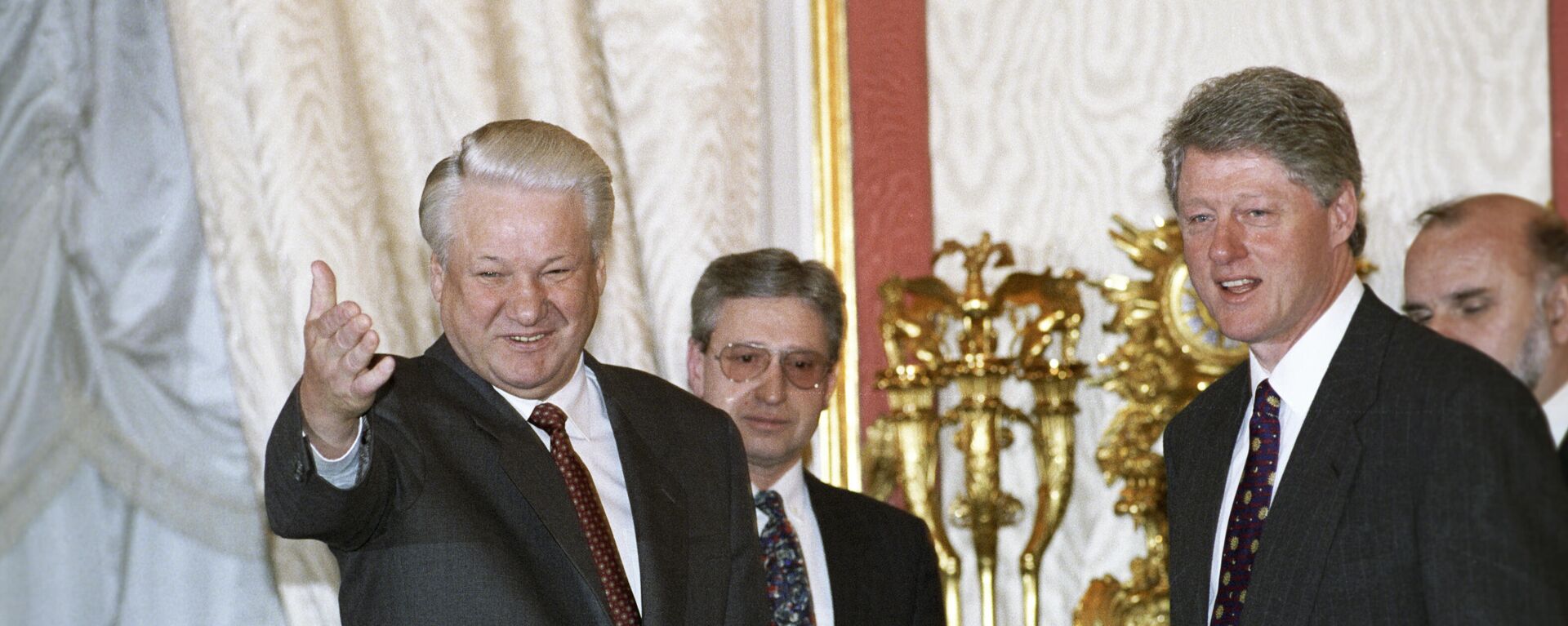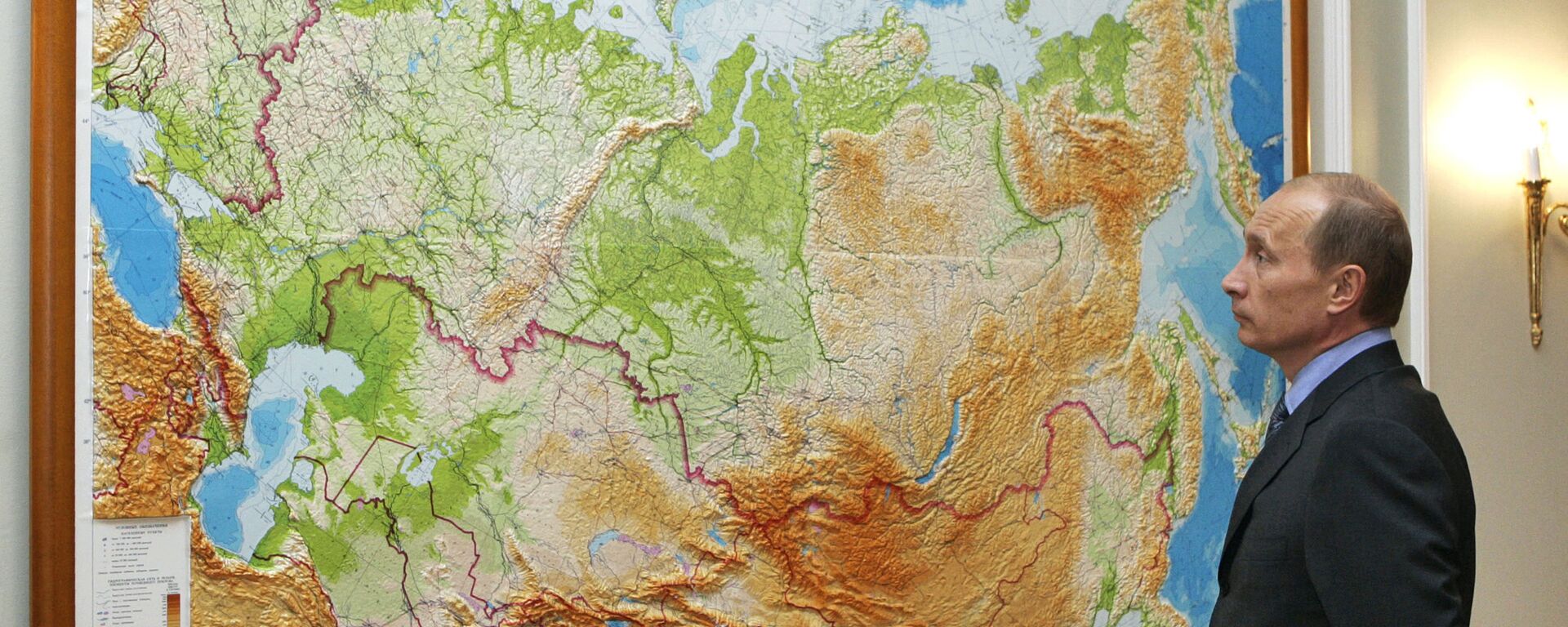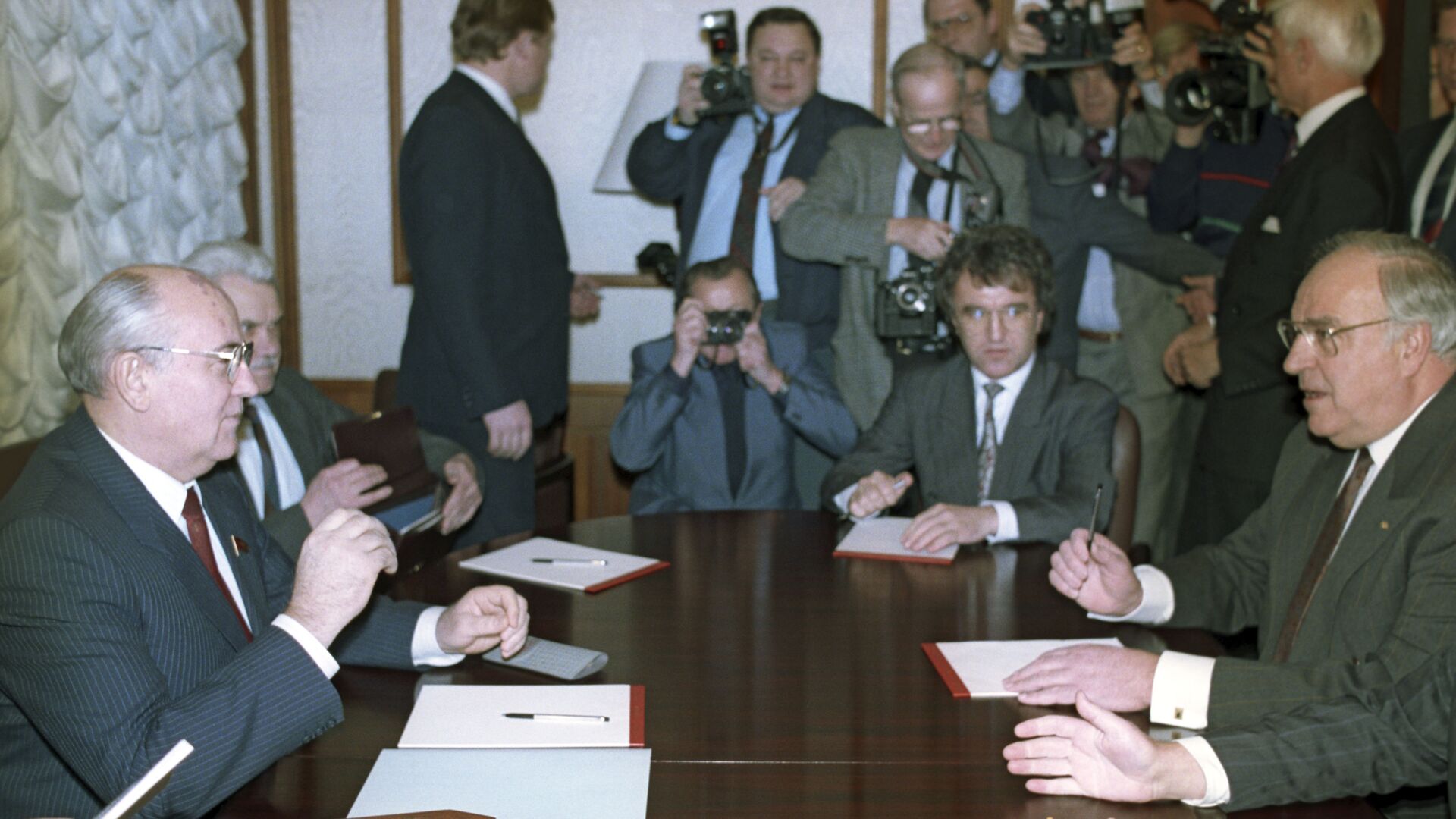https://sputnikglobe.com/20220221/berlin-claims-no-promises-on-nato-expansion-ever-made-to-russia-after-publication-of-archival-docs-1093229628.html
Berlin Claims No Promises on NATO Expansion Made to Russia Despite Release of Classified Doc
Berlin Claims No Promises on NATO Expansion Made to Russia Despite Release of Classified Doc
Sputnik International
Last week, Spiegel published a formerly classified document retrieved from the British National Archives dated 1991 which showed that Western powers made an... 21.02.2022, Sputnik International
2022-02-21T11:15+0000
2022-02-21T11:15+0000
2023-01-08T16:49+0000
soviet union
germany
expansion
promise
commitment
nato
https://cdn1.img.sputnikglobe.com/img/107714/94/1077149478_0:99:3024:1800_1920x0_80_0_0_6834901b551cec6f54a4544a2ef14db8.jpg
It's not the German Foreign Ministry's job to interpret old historical documents, and agreements signed between Moscow, Berlin and other Western powers don't contain any promises not to expand NATO, Foreign Ministry spokesman Christopher Burger has said."The NATO-Russia Founding Act was signed in 1997, precisely against the backdrop of the upcoming expansion of NATO eastward. In it, Russia and NATO reached an agreement on how certain Russian security interests can be taken into account in this process. We continue to stick to it today," the spokesman added. 'NATO Will Not Expand Beyond the Elbe'Late last week, Germany's Spiegel newspaper reported on a previously classified memo sourced from Britain's National Archives on talks between diplomats from the US, the UK, France, and Germany in Bonne on 6 March 1991 in which Western powers made clear that NATO membership of Eastern European states would be considered unacceptable in light of promises made to Moscow.Then-US assistant secretary of state Raymond Seitz agreed with his German colleague. "We have made it clear to the Soviet Union - in 2+4 as well as other talks - that we will not take advantage of the withdrawal of Soviet troops from Eastern Europe...NATO should not expand to the East, either formally or informally," Seitz said.The document adds weight to promises made by US Secretary of State James Baker in talks with Soviet leader Mikhail Gorbachev in February 1990, during which the US official assured his Soviet colleague that "not an inch of NATO's present military jurisdiction will spread in an eastern direction" after the planned reunification of East and West Germany, which required Soviet approval.The United States broke its promises just two years later. In 1994, after attending his first NATO summit in Brussels, US President Bill Clinton announced that the Western bloc's expansion was a question of when, not if. In 1997, when the NATO-Russia Founding Act was signed, Clinton presented Yeltsin with a fait accompli, with the Czech Republic, Hungary and Poland formally invited into the alliance just months after the treaty with Russia was agreed. With its global clout at a historic low point and its economy in shambles, in part thanks to the US advisors sent to Moscow to 'help' Russia with its transition to a market economy, there was little President Boris Yeltsin could do to stop the alliance's expansion.The Czech Republic, Hungary and Poland formally entered NATO in 1999, with Bulgaria, Romania, Slovakia and Slovenia, as well as the former Soviet Baltic republics of Estonia, Latvia and Lithuania joining in 2004. This expansion has continued since, with Albania, Croatia, Montenegro and North Macedonia joining between 2009 and 2020. NATO formally recognizes three additional 'aspiring members': Bosnia, Georgia and Ukraine.Russia has indicated that Ukrainian membership in the Western alliance would cross its 'red lines', with President Putin recently warning that if Ukraine joins the bloc and the US deploys offensive missile systems in the country, these systems would have a flight time to Moscow of just 4-5 minutes.In December, Russia proposed a pair of draft security treaties to the US and NATO aimed at dramatically easing tensions between Moscow and the West. Among the proposals' points was a request that NATO halt its eastward expansion into the former Soviet Union, including Ukraine, and dramatically reduce military deployments in countries which joined the alliance after 1997. The US and NATO have rejected Russia's proposals, saying that the Western bloc's 'open door' policy is non-negotiable, but expressed willingness to continue talks with Moscow on other issues.
https://sputnikglobe.com/20220219/1991-doc-proves-west-did-commit-to-non-expansion-of-nato-eastwards-broke-the-promise--report-1093161024.html
https://sputnikglobe.com/20210926/clinton-and-yeltsin-got-drunk-in-kremlin-restroom-book-claims-1089424356.html
https://sputnikglobe.com/20211226/putin-on-red-lines-west-has-pinned-russia-into-a-position-where-it-has-nowhere-to-fall-back-to-1091813306.html
soviet union
germany
Sputnik International
feedback@sputniknews.com
+74956456601
MIA „Rossiya Segodnya“
2022
News
en_EN
Sputnik International
feedback@sputniknews.com
+74956456601
MIA „Rossiya Segodnya“
Sputnik International
feedback@sputniknews.com
+74956456601
MIA „Rossiya Segodnya“
soviet union, germany, expansion, promise, commitment, nato
soviet union, germany, expansion, promise, commitment, nato
Berlin Claims No Promises on NATO Expansion Made to Russia Despite Release of Classified Doc
11:15 GMT 21.02.2022 (Updated: 16:49 GMT 08.01.2023) Last week, Spiegel published a formerly classified document retrieved from the British National Archives dated 1991 which showed that Western powers made an explicit commitment to Moscow not to expand the NATO alliance beyond the borders of a reunified Germany.
It's not the German Foreign Ministry's job to interpret old historical documents, and agreements signed between Moscow, Berlin and other Western powers don't contain any promises not to expand NATO, Foreign Ministry spokesman Christopher Burger has said.
"I would like to state once again that neither the '2+4' Agreement [on German reunification], nor the NATO-Russia Founding Act contained promises to Russia that NATO would not expand to the east. The '2+4' Agreement does not mention this issue at all, and any statements to the contrary do not correspond to reality," Burger said at a briefing on Monday, when asked to comment on the Spiegel report.
"The NATO-Russia Founding Act was signed in 1997, precisely against the backdrop of the upcoming expansion of NATO eastward. In it, Russia and NATO reached an agreement on how certain Russian security interests can be taken into account in this process. We continue to stick to it today," the spokesman added.
"I think that a government briefing, by definition, is not a historical commission. The Foreign Ministry has a political archive which everyone can access and study documents that are over 30 years old. Many historians use these archives. I will not try to interpret a thirty-year-old document. This is not our job," Burger stressed.
'NATO Will Not Expand Beyond the Elbe'
Late last week, Germany's Spiegel newspaper
reported on a previously classified memo sourced from Britain's National Archives on talks between diplomats from the US, the UK, France, and Germany in Bonne on 6 March 1991 in which Western powers made clear that NATO membership of Eastern European states would be considered unacceptable in light of promises made to Moscow.
"We made it clear during the talks that NATO will not expand beyond the Elbe. Therefore, we cannot offer membership in NATO to Poland and others," Federal Republic of Germany Foreign Ministry spokesman Jurgen Chrobog said in the memo.
Then-US assistant secretary of state Raymond Seitz agreed with his German colleague. "We have made it clear to the Soviet Union - in 2+4 as well as other talks - that we will not take advantage of the withdrawal of Soviet troops from Eastern Europe...NATO should not expand to the East, either formally or informally," Seitz said.

19 February 2022, 01:56 GMT
The document adds weight to promises made by US Secretary of State James Baker in talks with Soviet leader Mikhail Gorbachev in February 1990, during which the US official assured his Soviet colleague that
"not an inch of NATO's present military jurisdiction will spread in an eastern direction" after the planned reunification of East and West Germany, which required Soviet approval.
The United States broke its promises just two years later. In 1994, after attending his first NATO summit in Brussels, US President Bill Clinton
announced that the Western bloc's expansion was a question of when, not if. In 1997, when the NATO-Russia Founding Act was signed, Clinton presented Yeltsin with a fait accompli, with the Czech Republic, Hungary and Poland formally invited into the alliance just months after the treaty with Russia was agreed. With its global clout at a historic low point and its economy in shambles, in part thanks to the US advisors sent to Moscow to 'help' Russia with its transition to a market economy, there was little President Boris Yeltsin could do to stop the alliance's expansion.

26 September 2021, 14:27 GMT
The Czech Republic, Hungary and Poland formally entered NATO in 1999, with Bulgaria, Romania, Slovakia and Slovenia, as well as the former Soviet Baltic republics of Estonia, Latvia and Lithuania joining in 2004. This expansion has continued since, with Albania, Croatia, Montenegro and North Macedonia joining between 2009 and 2020. NATO formally recognizes three additional 'aspiring members': Bosnia, Georgia and Ukraine.
Russia has indicated that Ukrainian membership in the Western alliance would cross its 'red lines', with President Putin recently
warning that if Ukraine joins the bloc and the US deploys offensive missile systems in the country, these systems would have a flight time to Moscow of just 4-5 minutes.
In December, Russia proposed a pair of draft security treaties to the US and NATO aimed at dramatically easing tensions between Moscow and the West. Among the proposals' points was a request that NATO halt its eastward expansion into the former Soviet Union, including Ukraine, and dramatically reduce military deployments in countries which joined the alliance after 1997. The US and NATO have rejected Russia's proposals, saying that the Western bloc's 'open door' policy is non-negotiable, but expressed willingness to continue talks with Moscow on other issues.

26 December 2021, 12:01 GMT




